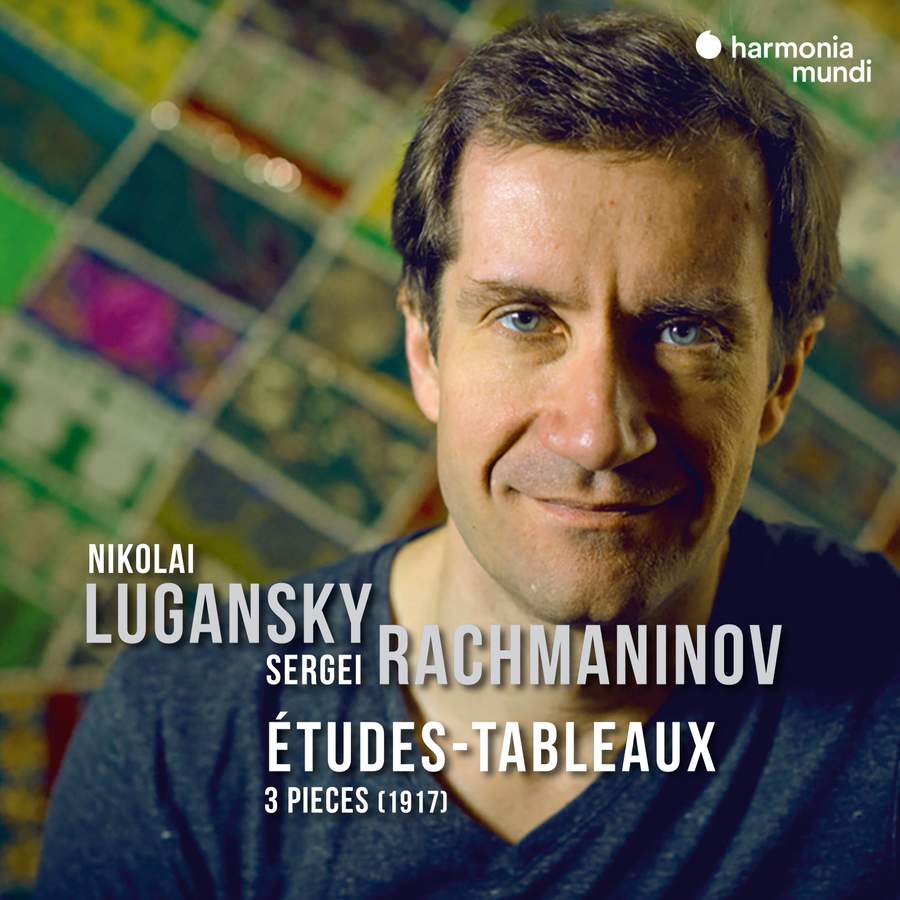RACHMANINOV Études-Tableaux (Nikolai Lugansky)
View record and artist detailsRecord and Artist Details
Genre:
Instrumental
Label: Harmonia Mundi
Magazine Review Date: 03/2023
Media Format: CD or Download
Media Runtime: 74
Mastering:
DDD
Catalogue Number: HMM90 2297

Tracks:
| Composition | Artist Credit |
|---|---|
| (9) Etudes-tableaux |
Sergey Rachmaninov, Composer
Nikolai Lugansky, Piano |
| Fragments |
Sergey Rachmaninov, Composer
Nikolai Lugansky, Piano |
| Oriental Sketch |
Sergey Rachmaninov, Composer
Nikolai Lugansky, Piano |
| Prelude |
Sergey Rachmaninov, Composer
Nikolai Lugansky, Piano |
Author: David Fanning
The Études-tableaux were not made for performing or hearing as a cycle. They are too much for one half of a concert but too little for two halves. Nor is it all that common to find them all on a single CD, which is perhaps hardly surprising, given that they are a lot for a player or listener to digest at one sitting. Heard seriatim, they do not necessarily compel understanding as a cycle; but they do reveal new qualities. For one thing, the first of Op 33 and the last of Op 39 are both clamorous marches, which makes for an imposing frame. For another, unbroken listening cannot but reinforce admiration for the music’s sheer expressive range and resourcefulness.
Lugansky, who previously recorded the Études-tableaux 20 years ago for Challenge Classics, joins Steven Osborne as the most high-profile single-disc exponent. On balance, Osborne is in places marginally the more crisp, Lugansky marginally the more temperamental and grand-scale. Each is undaunted by anything Rachmaninov can throw at him. Each knows how the voice-leading works, even when the score is teeming with subsidiary voices. Each has his own individual conception of every piece. Lugansky declares his in the Harmonia Mundi booklet, making reference to other Rachmaninov repertoire and to various icons and archetypes of Russian literature and history. From the wistful poetry of the A minor No 2 of Op 33 to the tintinnabulating torrents of the C minor No 7 of Op 39 (seen by Lugansky as summing up the whole cycle), via the whirlwind E flat minor No 6 of Op 33, he is the master of all he surveys. He was that, admittedly, at the time of his Challenge Classics recording (9/03), which is currently available for streaming or as a download. In the meantime he has arguably gained a little in subtlety and lost a fraction in fire; but the differences are minimal.
This is not to say that the listed comparisons of excerpts are put in the shade. Richter is matchless for sheer scale and symphonic grasp; Freddy Kempf in the complete Op 39 set has countless subtleties and a superior recording quality (the Harmonia Mundi acoustic for Lugansky is a fraction dry); and Pletnev performs minor miracles on one of Rachmaninov’s own instruments. Place Lugansky alongside such exceptional versions and you have a rich display of some of the most precious jewels in the piano repertoire.
Discover the world's largest classical music catalogue with Presto Music.

Gramophone Digital Club
- Digital Edition
- Digital Archive
- Reviews Database
- Full website access
From £8.75 / month
Subscribe
Gramophone Full Club
- Print Edition
- Digital Edition
- Digital Archive
- Reviews Database
- Full website access
From £11.00 / month
Subscribe
If you are a library, university or other organisation that would be interested in an institutional subscription to Gramophone please click here for further information.




